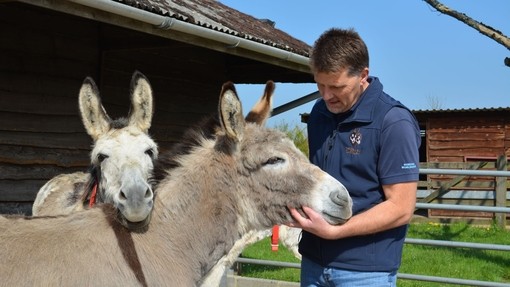How can infection spread?
- Physical contact: Direct contact between animals such as when playing, mutual grooming or feeding together.
- Aerosols: These are produced when a donkey sneezes or coughs, similar to humans with a cold or flu. Fine suspended particles can be spread through the air and directly inhaled by others or can be inhaled when coming into contact with infected feed or bedding.
- Fomites: Fomites are objects or materials that are contaminated and are likely to carry infection. This could be faeces, mucous, blood and even your clothes and footwear if stroking or cuddling an infected animal. Dirty grooming kits, head collars, buckets and tools can also carry infection.
- Vectors: The most common vectors are biting insects. These are seasonal threats as they die off in the winter, but your donkey may well encounter other vectors, such as birds, wildlife, vermin or other visiting mammals
How to prevent infections from spreading
- Always practice good hygiene. Wash hands and ensure outerwear and footwear is clean before moving from one group of animals to another.
- Always wash hands before and after handling any animal or touching objects that have been in contact with animals.
- Wash your hands before eating or drinking or if you have been touching objects that have been in contact with animals. Do not eat or drink near them.
- Ensure any visitors have clean outer clothing and footwear and check that they haven’t been in contact with infected animals.
- Quarantine new or sick animals with their companion, practice strict biosecurity and use separate tools and equipment for that group. Make sure that any infection they may have cannot spread to any other animals. Ensure all equipment is disinfected after use.
- Protect food and water where practical, from vermin and other wildlife, as they may spread disease.
Signs of ill health donkeys
It is important to seek veterinary advice if you suspect that your donkey is unwell.
Check your donkey daily for signs of illness. Signs of ill health are often very subtle in donkeys. They may include:
- Swellings on the body, particularly jaw and neck area
- Eating or drinking less
- Thick discharge from eyes or nose
- Patchy hair loss/sores
- Changes in behaviour/dullness
- Coughing or changes in breathing The respiration rate for a healthy donkey ranges from 12 to 28 breaths per minute, with an average of 20 breaths per minute
- Temperature higher than 37.8C.
Download Biosecurity Posters
Our donkey owner biosecurity posters can be downloaded and printed out for information at a glance.




